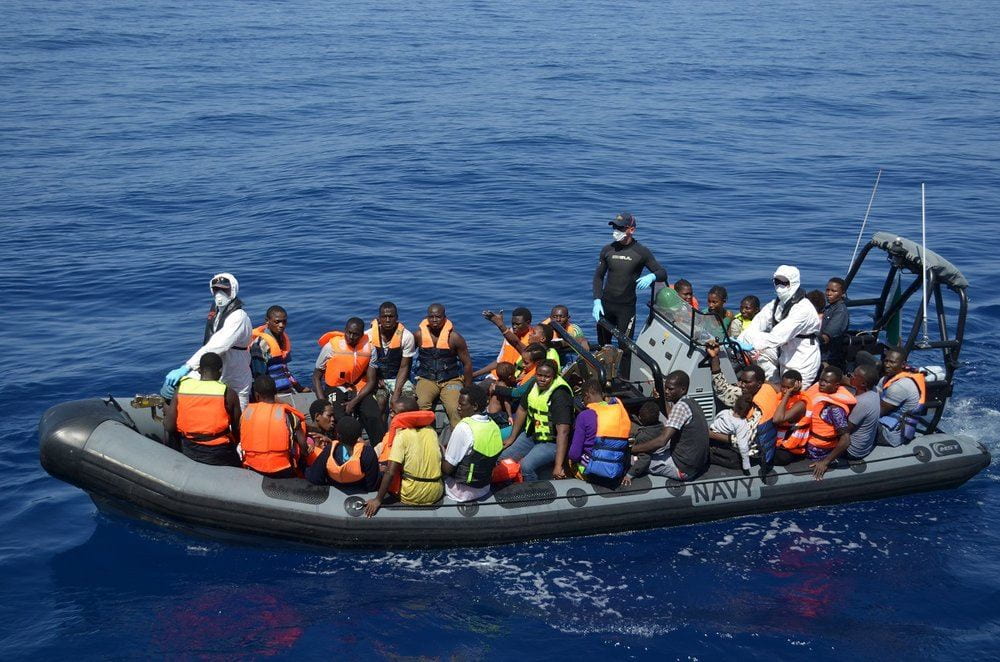Italy has become a destination of hope for people fleeing other countries; especially Africans seeking a better life and future for themselves and their families. Their endeavour is fueled by these hopes, despite the risk and horror associated with the migration process, which has become an ordeal for many in recent years. The journey is not a direct and straight one.
Due to the rigidity of the European borders, they face numerous perils along the way to their destination. People drown in the sea, starve to death in the desert, and some are even auctioned off for slavery. All of this has led to an increase in the migrant death rate to 2.1 per 100 last year.

The two major reasons for many of these attempted escapes to Europe are poverty and the violence that comes with it. The appalling and corrupt state of their countries, where governments do little to provide for citizens adequately, drives them to flee their home for what is supposed to be a better life. In the haste to reach Italy by crossing the Mediterranean Sea, many Africans come across the tribulations of Libya. According to an investigation and article published by CNN, migrants trapped along the Libyan coast have been held captive and sold for as little as $400 to slave buyers. This modern-day slave trade has become a business and source of income for both buyers and sellers; people are making a profit off this illegal act, therefore there is an interest in keeping the flow of immigrants into Libya moving. This system is pure evil. Officials from the Libyan Anti-Illegal Immigration Agency confirmed that they are aware of the activities of organized gangs that operate smuggling rings in the country. The government of Libya claims to take action to stop the illegal activities, but they have little to show for their efforts. According to CNN reporters, the authorities indicated that they had not witnessed any slave auctions themselves, but promised to launch their own investigation. The Italian government, in the meantime, has claimed to devise a contentious plan to try and curtail human trafficking and illegal migration of people across the Mediterranean. It agreed to fund a limited naval mission that is carried out in coordination with the Libyan coastguard. Essentially, Italy agreed to pay the government of the North African country to keep immigrants from reaching Europe, effectively worsening the situations for those stuck on the shores.
The question many people, including myself, are asking is: what are the countries of origins doing to help, in light of the suffering their people endure abroad? The answer is difficult to pinpoint but they are obviously doing very little. In November 2017, an initiative by the Nigerian government to repatriate 242 Nigerians made waves in the news media. According to news reports, around 5,000 Nigerians returned from Libya over the course of that year. But what about the many others who are stuck in detention centres or subjected to the ongoing slave trade? As an international student coming from an African country, I have a reasonable level of understanding for what these immigrants go through before making the hard decision to leave their home in search of a better life. The governments in a majority of the developing countries in Africa are influenced by corrupt individuals who aim to satisfy their selfish wants and do nothing to help the poor. There are no opportunities or provisions for them; rather, they are punished for being poor and become victims of violence and hardship. The mentality becomes: “It is better to die trying, than die watching.” I still hope and believe that countries in the nearest future are able to create a more sustainable environment for their people. In collaboration with the United Nations and other bodies they need to strive to eradicate poverty and the violence that comes with it; that is the only way forward.
A concrete improvement of the current situation requires that African governments come together in conjunction with the European Union to initiate major policy changes. A promising process began in 2015 in establishing an Emergency Trust Fund for Africa with the aim to eradicate the root causes for illegal migration. The European Union has started this initiative in the Sahel and Lake Chad region, the Horn of Africa and North Africa. Eventually, it is envisioned to expand to more geographical areas. Another EU initiative, the Partnership Framework on Migration, was launched in 2016 in cooperation with Nigeria, Niger, Ethiopia, Senegal and Mali. It has already extended across more developing countries where illegal immigration is dominant. The European Union and regional bodies such as ECOWAS (the Economic Community of West African Countries) can also improve intra-African mobility and make efforts towards enabling and processing asylum request before disaster strikes on the long and arduous way to Europe that has claimed the lives of too many.

Oghenefejiro Ophori is a a first year international student at the University of Guelph in the criminal justice and public policy program. She strongly believes that the issue of illegal migration is a very sensitive topic and is as a result of numerous push and pull factors. She hopes that with great effort and determination from government of the home countries and developed countries with various organizations, the issue will be curtailed in the nearest future.

